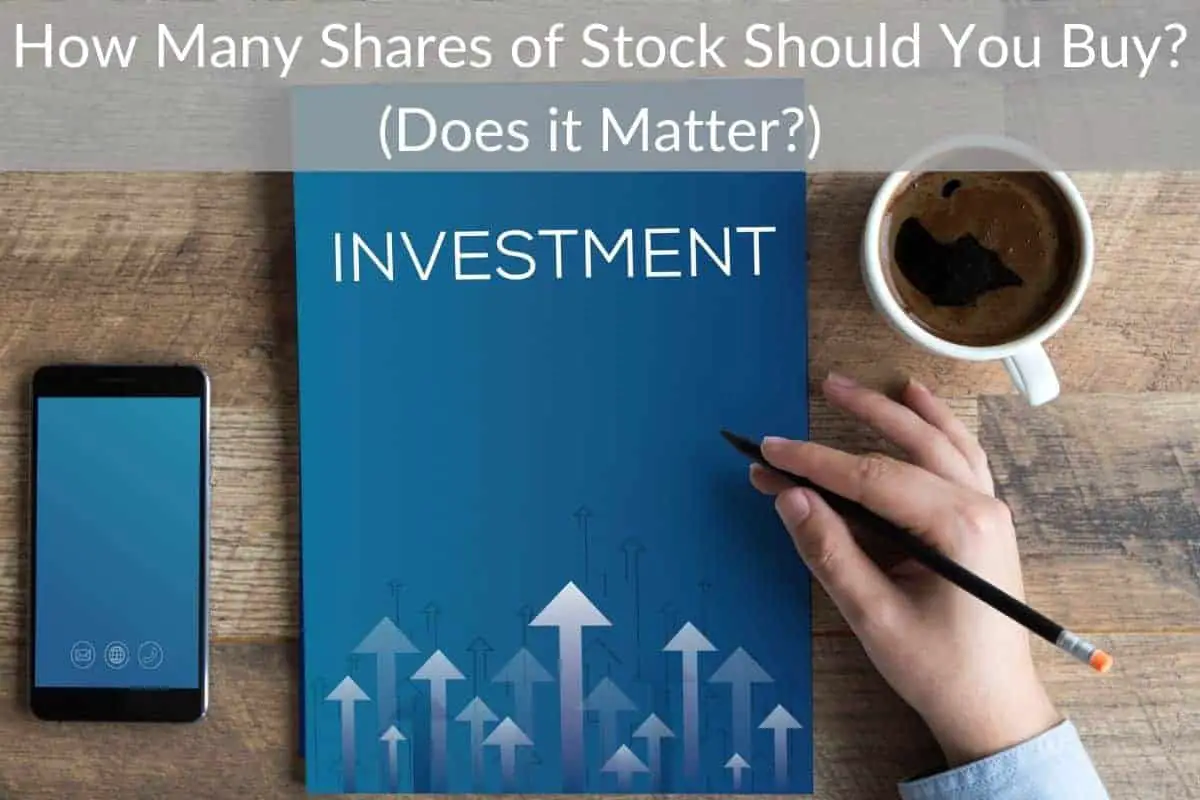Table of Contents
*This post may contain affiliate links. As an Amazon Associate we earn from qualifying purchases.
As a new investor, you might feel a sense of urgency to fill your portfolio. In fact, you’re probably wondering how many shares of stock should you buy? Does it matter?
You should buy as many shares of stock that you can afford that fits in with your investment plan. In addition you have to consider how much capital you have available, diversification of your portfolio and whether you can buy fractional shares of stock.
There are a few factors to consider when deciding how many shares of a particular stock to buy. The first and most important thing to think about is what exactly is your investment plan.
If you are investing $50 a month trying to accumulate as many shares as possible in a certain stock, then you will want to buy as many shares as that $50 will buy you.
However, if you are investing into multiple different stocks or ETFs simultaneously then you will want to figure out exactly how many shares of each you can buy with a portion of your investment.
With that in mind, here’s a quick guide that can help you determine the ideal number of shares to buy.
Keep in mind, you should never feel pressured into buying a specific amount of shares of a company’s stock.
For the best results, you should start small instead of trying to fill your portfolio all at once!
How Many Shares Of Stock Should You Buy?
Here are a few questions to ask yourself when determining how many shares of stock you should buy.
How Many Shares Can I Buy Based On The Price?
First, let’s look at how many shares you can buy.
Assuming your broker doesn’t charge commissions for stock trades (most of the popular online brokers don’t), calculating the number of shares you can buy with a certain amount of money is easy.
Here’s the three-step process:
- Find the current share price of the stock you want. You can obtain a quote through your broker or through a financial website. Make sure you’re looking at a real-time quote, not a delayed one.
- Divide the amount of money you have available to invest in the stock by its current share price.
- If your broker allows you to buy fractional shares, the result is the number of shares you can buy. If you can buy only full shares (most common), round down to the nearest whole number.
As an example, let’s say I want to buy Apple (NASDAQ:AAPL) stock and I have $2,000 to invest.
According to a real-time stock quote, Apple is trading near $150 per share as I’m writing this. Dividing those two numbers gives me about 13.33 shares. .
My broker currently does not support fractional shares, so this means I can afford to buy thirteen shares of Apple.
What About Diversification?
Here’s an important point, especially for newer investors. Just because you can buy a certain number of shares of a particular stock doesn’t mean you should.
For example, if you put $1,000 into a newly opened brokerage account, and a stock you want to own trades for $50, you have the ability to buy as many as 20 shares.
However, don’t forget about portfolio diversification.
Instead of a large position in one stock, maybe a better investment strategy would be to spread your initial brokerage deposit across a few different companies.
Most experts tell beginners that if you’re going to invest in individual stocks, you should ultimately try to have at least 10 to 15 different stocks in your portfolio to properly diversify your holdings.
And, since most brokers no longer charge commissions for online stock trades, it’s more practical than ever to spread a relatively small amount of capital across many different stock positions.
Is It Worth Buying Only One Share Of Stock?
When buying stocks for the first time (or with a smaller amount of money) it might not seem worthwhile to buy a single share of a company. But is it?
Buying a single share of a company is worth it especially if you continue to buy on a regular basis. In fact, with the emergence of commission-free stock trading, it’s quite feasible to buy a single share whereas it would have been a horrible decision just a few years ago.
Several times in recent months I’ve bought a single share of stock to add to a position simply because I had a small amount of cash in my brokerage account.
However, if your broker is one of the few who still charges commissions, it might not be practical to make small investments.
Is It Possible To Buy Less Than One Share Of Stock?
If you want to invest in a company like Apple but don’t have or want to invest $150 to buy one share (it’s current price at the time of this writing) then you might be wondering if you can buy less than a share.
Many online brokerages allow you to purchase partial shares (sometimes called fractional shares) but not all of them do. So you will have to check with your specific brokerage to see if they offer that or not.
The concept of fractional shares has been around for years, mainly for the purposes of dividend reinvestment.
For example, if a stock position you own pays you a total of $10 in quarterly dividends and the share price is $40, dividend reinvestment typically allows you to buy 0.25 additional shares.
In recent years, however, brokers have started to embrace the idea of allowing investors to directly buy fractional shares.
There are two big benefits of fractional share investing. First, it gives newer investors access to stocks with a high share price.
As one example, if Amazon.com (NASDAQ:AMZN) is trading for $3,500 per share, an investor with only $500 to invest could buy 0.14 shares of the stock.
Second, fractional share investing allows investors to put all of their money to work.
Using our Amazon example, if you had $4,000 to invest and didn’t have the ability to buy fractional shares, you would be able to purchase just one share and have $500 left over.
With fractional shares, you could invest your entire $4,000 and purchase 1.14 shares of the e-commerce giant.
Final Thoughts
So.. how many shares of a stock should you buy?
The bottom line is that there is no universal answer to this question. It depends on your personal situation.
Just remember to consider these important factors:
- How much money you have to invest.
- Whether you need to diversify your investment portfolio or want to put all your available capital into the stock.
- Commissions or brokerage fees you have to pay (if any).
As I mentioned in the beginning of this article, it’s best to start small when you’re just starting out investing in stocks.
You should resist the urge to fill your portfolio immediately as this can lead to significant risk and losses.
Some online brokers also have limits for how many trades you can make in a day, so that’s something to think about as well.

